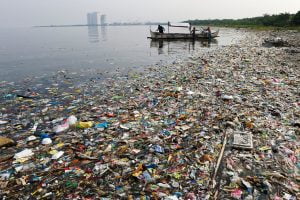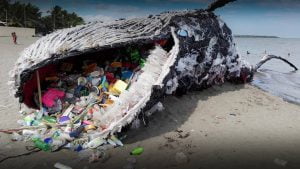
Each year, an estimated 18 billion pounds of plastic is dumped into our oceans from coastal regions. According to a study by the World Economic Forum, at the current rate of pollution, there will be more plastics than fish, by weight, in the ocean by 2050. To help reverse this trend, here are three tips from the nonprofit BoatUS Foundation for Boating Safety and Clean Water to help boaters reduce plastic waste and pollution while on the water.
3 Simple Ways to Reduce Plastic Waste and Pollution When Boating
- Pack for the boat trip: Microplastics are very small pieces of plastic, less than 5mm in size, that are the
 result of larger plastic products partially decomposing from sunlight, heat and wave action. While we haven’t seen the full effects on humans consuming fish and other marine species contaminated with microplastics, studies show that ingested microplastics can seriously damage marine organisms. One of the simplest ways to reduce plastics aboard your boat is to fill up and carry aboard (or stash in a cooler) an insulated container that can hold enough cold water for the day instead of buying individual bottles. Invest in a set of non-breakable plates, cutlery, and food and drink containers to limit single-use plastics aboard. These efforts won’t break the bank, don’t take a lot of extra effort, and can pay big dividends for boaters and the environment in the long-term.
result of larger plastic products partially decomposing from sunlight, heat and wave action. While we haven’t seen the full effects on humans consuming fish and other marine species contaminated with microplastics, studies show that ingested microplastics can seriously damage marine organisms. One of the simplest ways to reduce plastics aboard your boat is to fill up and carry aboard (or stash in a cooler) an insulated container that can hold enough cold water for the day instead of buying individual bottles. Invest in a set of non-breakable plates, cutlery, and food and drink containers to limit single-use plastics aboard. These efforts won’t break the bank, don’t take a lot of extra effort, and can pay big dividends for boaters and the environment in the long-term. - Get your crew involved: Before heading out, provide your crew with a pre-departure briefing and remind them not to put anything overboard. Boats are notoriously windy places, and popular, crowded summer anchorages are particularly prone to wind-driven pollution. When underway, secure possessions as well as any trash below deck or in a storage container. If anything is lost overboard, or if you come across plastic pollution such as a deflated birthday balloon, and conditions permit, it may be a good opportunity — and good practice — for the captain and crew to safely conduct a man-overboard drill to retrieve the item.
- Recycle: If your family gets you a fishfinder, a pair of shiny, new boat fenders, or a new boat doodad for your birthday or other event, thank them profusely but unwrap the gift at home and recycle the gift’s packaging if possible. If your marina or boat club doesn’t have a recycling program for plastics and other recyclables, ask about starting one. Ensure all your boating guests know where recyclables go. When fishing, do your best to retrieve fishing line snags, and when respooling, recycle the old line instead of throwing it in the trash.
###
About the BoatUS Foundation for Boating Safety and Clean Water:
The BoatUS Foundation for Boating Safety and Clean Water is a national leader promoting safe, clean and responsible boating. Funded primarily by donations from the more than half-million members of Boat Owners Association of The United States (BoatUS), the nonprofit provides innovative educational outreach directly to boaters and anglers with the aim of reducing accidents and fatalities, increasing stewardship of America’s waterways and keeping boating safe for all. A range of boating safety courses – including 36 Free State courses – can be found at BoatUS.org/Courses.


